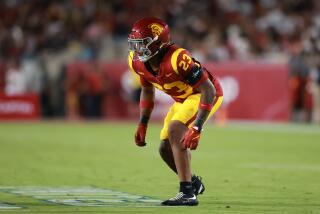UCLA’s defense faces big challenge against USC
Make no mistake about it, UCLA’s defense was the main source behind the Bruins’ 13-9 upset victory over USC last season at the Rose Bowl.
Defensive coordinator DeWayne Walker’s unit held the Trojans to 55 yards rushing -- an average of 1.9 yards per carry -- and applied steady pressure on quarterback John David Booty throughout the game.
The Bruins’ game plan execution was nearly flawless.
By exploiting the Trojans’ offensive tendencies with a mixture of blitzes and tight coverage provided by cornerbacks Trey Brown, Rodney Van and Al Verner, UCLA forced USC to punt a season-high seven times and stopped the Trojans twice on fourth-down plays.
Now here’s the $17-million Rose Bowl question of the week: Can UCLA’s defense do it again when it faces USC Saturday at the Coliseum with a Pacific 10 Conference title on the line?
At first glance, the answer would be no.
Booty is a more experienced quarterback than he was last season and he’s coming off a 375-yard, four-touchdown passing game in a victory at Arizona State last week.
After sitting out three games because of a broken finger on his throwing hand, Booty has displayed the type of leadership Coach Pete Carroll has needed in getting USC back into the Bowl Championship Series bowl game picture.
The Trojans’ offense has also shown more balance this season thanks to an effective running game led by tailbacks Chauncey Washington, Stafon Johnson and Joe McKnight.
In 10 games, USC has averaged 186.6 yards rushing and 4.8 yards per carry. That’s a far cry from last season, when the Trojans averaged only 128 yards rushing.
But games are won on the field, not on paper. The Bruins proved that a year ago.
Before he was hired to lead UCLA’s defense, Walker spent several years in the NFL working under several respected defensive minds in Gregg Williams (Washington coordinator), Johnnie Lynn (New York Giants coordinator) and Bill Belichick and Carroll (New England head coaches).
While the Bruins have had their share of problems defending spread offenses with mobile quarterbacks -- which also has been a problem for USC over the years -- Walker’s NFL background works well against the Trojans’ pro-style attack.
Since USC does not often use multiple wide receiver formations, the Bruins are able to stick more with their 4-3 base personnel, which usually cuts down on blown assignments in the secondary and allows UCLA to focus on shutting down bread-and-butter plays.
Last year, Walker’s defense gave a textbook case on how this strategy works.
Although the Bruins’ defensive front lacked the size to physically overpower USC’s linemen, they played with more force and used their quickness to control the line of scrimmage.
This made the Trojans’ offensive linemen a little bit antsy. They were called for four false starts and their stances at the line often tipped UCLA on whether it was a pass or run play.
The Bruins -- led by safeties Chris Horton and Dennis Keyes -- also did a good job reading Booty’s eyes when he dropped back to throw. That’s why there were times when UCLA seemed to know USC’s plays better than the Trojans.
But expect offensive coordinator Steve Sarkisian to have USC better prepared Saturday based on how he called plays against Arizona State last week.
Instead of trying to establish the run first, Sarkisian went to the air six times on USC’s opening seven-play scoring drive. He kept Booty on the move throughout and helped him with first-down play-action passes that forced the quarterback to look away from his targets.
Whether it was a run fake to the right and then throw left or run fake left and then rollout right, Booty made completing passes look easy against a respected Arizona State defense.
By the second half, the Sun Devils had no choice but to gamble on first down and when they guessed wrong, Booty made them pay. If this happens Saturday, UCLA will be in trouble.
That’s because the Bruins are at their best when they can shut down first-down plays and force an offense into predictable calls. They did that well in a 16-0 victory over Oregon last week.
Summary: At the end of the day, this year’s UCLA-USC rivalry game will not be determined by any defensive scheme or offensive play called.
It will be decided by which team wins the most one-on-one battles.
Last year, the Bruins exploited the Trojans’ athletically challenged offensive line.
But this season, USC’s offensive front has been a strength and that could be the difference for the Trojans on Saturday.
More to Read
Go beyond the scoreboard
Get the latest on L.A.'s teams in the daily Sports Report newsletter.
You may occasionally receive promotional content from the Los Angeles Times.










